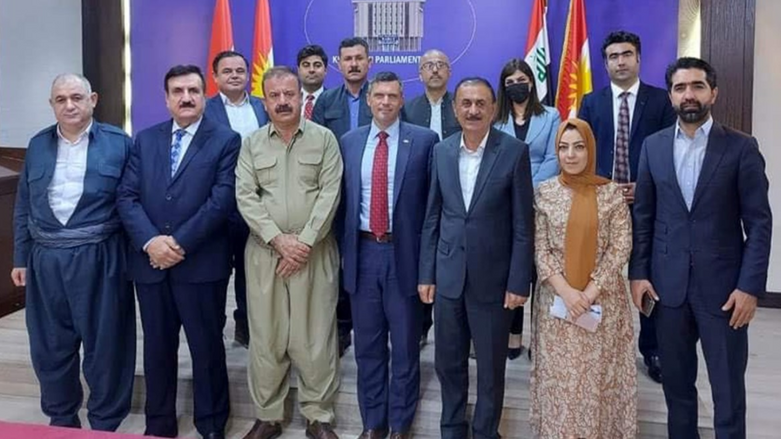Kurdistan Parliament's Peshmerga Affairs Committee discusses Peshmerga Reform with US, Dutch Consulates

ERBIL (Kurdistan 24) –Kurdistan Parliament’s Peshmerga Affairs Committee met officials of the US and Dutch Consulate General representing the Multinational Advisory Group (MNAG) on Wednesday to discuss the latest updates on reforming the Kurdistan Region’s Peshmerga forces.
Chair of the Peshmerga Affairs Committee, Reving Hirori, received the MNAG representatives. They were Spencer Fields, Director of Political Affairs at the US Consulate General, Said Hakimi, Second Secretary for Political Affairs of the Netherlands Consulate General, and Ala Rafiq, the US Consulate General’s Political Affairs Assistant.
“They discussed reforms, the projects that the International Coalition is undertaking to unify the Peshmerga forces, and the obstacles to the reform process,” a press release from the Kurdistan Parliament said on Wednesday.
On behalf of the Multinational Advisory Group (MNAG) 🇺🇸&🇳🇱 met with the @KurdistanParl’s Peshmerga Committee to discus Peshmerga Reform and related security topics. Inclusion of KRI’s democratic institutions is key, so that institutionalisation of #Peshmerga will benefit all #KRI https://t.co/PeWN6tBke5
— Said Hakimi🌐 (@said4bz) October 6, 2021
Hakimi said in a tweet that the US and Dutch consulates met on behalf of the MNAG with the Kurdistan Parliament’s Peshmerga Committee to “discuss Peshmerga Reform and related security topics. Inclusion of KRI’s (Kurdistan Region of Iraq) democratic institutions is key, so that institutionalization of Peshmerga will benefit all KRI.”
The Netherlands, the US, the UK, and Germany form the unique Multinational Advisory Group that enthusiastically supports the project to remove local politics from the Peshmerga forces’ chain of command.
Other topics that were covered in the meeting included military supplies and assistance, particularly the financial assistance provided by the United States to the Peshmerga, the future of the coalitions’ presence, and the drone and missile attacks against the Kurdistan Region.
The US-led coalition against ISIS pays stipends to the Ministry of Peshmerga and also delivers essential supplies such as ammunition, vehicles, food, and fuel through the Pentagon’s Counter-ISIS Train and Equip Fund program in Iraq.
“The Peshmerga Committee and the US and Netherlands consulate general officials also talked about the need for greater cooperation between the Peshmerga forces and the Iraqi federal army in order to fill security vacuums, and for this purpose the need to try to create a decision room for all sides to come to decisions together,” the parliament said.
There are ongoing talks between the Ministry of Peshmerga and Iraqi Security Forces on establishing joint commands and brigades in disputed territories between the Iraqi federal government and the KRG, such as Kirkuk and Makhmour.
Those territories face constant threats from remnants of the Islamic State (ISIS) group due to a security vacuum that emerged after Iraqi forces and Iranian-backed groups of the Popular Mobilization Forces (PMF) pushed the Peshmerga from these disputed areas following the Kurdistan Region's 2017 independence referendum.
